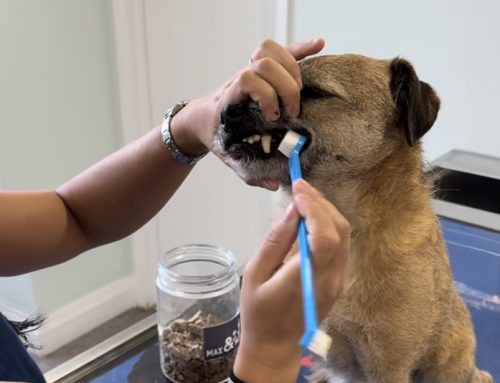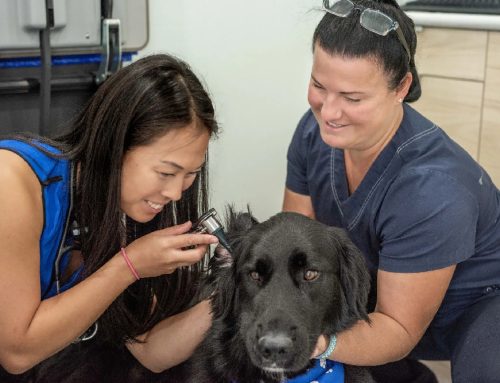Scratching the Surface: Top 3 Reasons Pets Itch
Chronic itching can be frustrating for pets, who are uncomfortable, and their owners, who want their pets to feel better. Constant scratching, licking, or biting usually indicates an underlying issue that requires diagnosis and treatment by our Mac Animal Clinic team. Understanding common itching causes and how you can help when your pet begins to scratch is paramount to resolving the problem. We will share the top three itchy skin causes in pets and some helpful treatment options.

1. Allergies in pets
Like humans, pets can develop allergies to various environmental triggers, including pollen, grass, mold, dust mites, flea bites, and certain foods. Rather than causing hay fever as allergies do in humans, pet allergies cause skin inflammation. Allergic skin inflammation makes pets feel relentlessly itchy and can cause skin redness, skin infections, ear infections, and sometimes gastrointestinal (GI) upsets.
Pets with allergies may experience seasonal flare-ups, particularly during spring and fall when pollen levels are high. Food allergies can cause year-round itching and chronic ear infections. Flea bite allergies can also cause severe itching during any season and lead to hair loss and skin inflammation.
2. Skin infections in pets
Bacteria and yeast naturally live in balance on the skin, but inflammation from allergies or trapped moisture can lead to infections due to bacterial or fungal overgrowth. When secondary to allergies, skin infections can worsen the itching and prevent treatments from working. Skin infection signs vary depending on the underlying cause, but can include:
- Red bumps
- Patchy hair loss
- Scaling, scabbing, or plaques
- “Gym sock” odor
- Red, darkened, or thickened skin
Ringworm is a fungal infection caused by dermatophytes, a family of pathogenic fungi that cause ring-shaped skin lesions or athlete’s foot. Ringworm is common in cats but can occur in dogs. Any pet who develops itchy skin requires a diagnostic workup to rule out whether yeast, dermatophyte, or bacterial infections are contributing to their problem. Diagnostics allows your vet to determine the true cause of the infection and allows the underlying cause to be addressed.
3. Parasites in pets
Fleas and other parasites, such as skin mites or ticks, can also cause itchy, irritated skin in pets. Regular parasite prevention and routine skin checks are essential for protecting your pet from external parasites.
- Mites — These tiny arachnids burrow into the skin and cause mange. Ear mites infest the ears and can cause itching and thick ear discharge.
- Mange comes in two types:
- Demodectic — Demodectic mange is not usually itchy unless a secondary infection develops.
- Sarcoptic — Sarcoptic mange, also known as scabies, is intensely itchy, highly contagious, and can spread between pets and other species—including humans.
- Ticks — These blood-feeding parasites attach to a pet’s skin and can transmit diseases. Some pets develop local infections or have allergic reactions to tick bites, which can lead to the same itchy, red skin and hair loss caused by other allergies.
Treating itchy skin in pets
Once our team identifies the cause of your pet’s itchy skin, we can recommend appropriate treatment options to provide them with relief. Allergies can be challenging to treat, because it is often not possible to “cure” allergies. Allergic pets require life-long allergy management and often different forms of treatment. At Mac Animal Clinic we use a multi-modal approach to manage skin disease, some treatment options may include:
- Topical treatments — Frequent bathing with medicated shampoos or applying sprays and mousses can help control bacterial and yeast populations and reduce inflammation from skin conditions. Bathing also helps to mechanically remove allergens from your pet’s skin.
- Anti Itch medications — These medications target the itch pathway and provide relief for itchy pets, they also prevent self-trauma and help reduce inflammation by reducing your pet’s drive to lick or scratch.
- Oral medications — Antibiotics, antifungals, antihistamines, and immune system modulators may be required to control itching, inflammation, and secondary skin infections.
- Dietary changes — An elimination diet trial can diagnose and treat food allergies or sensitivities.
- Parasite control — Parasite preventative medication treats fleas, ticks, and mites. This medication is crucial for pets with itchy skin conditions.
- Allergy injections — Allergy immunotherapy (i.e., allergy shots) can desensitize pets to specific environmental allergens.
- Supplements — Supplements like omega-3 fatty acids can support skin health, decrease inflammation, and repair the skin barrier.
Addressing the underlying cause of itchy skin requires collaboration between pet owners and our Mac Animal Clinic veterinary team. Contact us if you have questions about your pet’s treatment plan or you would like to schedule a visit and so we can perform a diagnostic workup for itchy skin.











